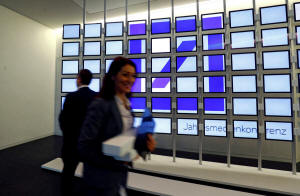Analysis: Deutsche Bank's rollercoaster ride towards more stability
 Send a link to a friend
Send a link to a friend
 [December 16, 2022] By
Tom Sims and Marta Orosz [December 16, 2022] By
Tom Sims and Marta Orosz
FRANKFURT (Reuters) - In 2019, Deutsche Bank set out on a journey to cut
dependence on its volatile investment bank and rely instead on more
stable businesses that serve companies and retail customers as a way to
restore profitability.
It didn't quite turn out that way.
Germany's biggest bank is back in profit and on course to meet some key
targets pledged to shareholders, but that is thanks to the investment
bank.
Deutsche's bottom line has benefited from a surge in securities trading
and dealmaking – the very businesses that the bank was trying to rely
less on after years of scandals and fines.
A long period of low interest rates and the pandemic complicated
Deutsche's plan of making more money from the bread and butter business
of lending to companies and individuals.
But the tide, buoyed by rising interest rates, is turning.
Higher interest rates are fattening profits from regular banking, while
there has been a decline in M&A deals.
The bank said it is starting to see a rebalancing away from the
investment bank to its other businesses.

"We do not expect that the majority of the bank's growth between now and
2025 will come from investment banking," board member Fabrizio Campelli
said in an interview. He previously managed Deutsche's overhaul process
and now oversees the corporate division and investment bank.
The bet in 2019 was for the investment bank to make up 30% of revenues
at Deutsche's key divisions, as the company exited equities trading,
with the focus more on corporate and retail banking.
But when the pandemic hit in 2020, this created volatile markets that
favoured the bank's bond trading business, where it is one of the
world's biggest players. This made the investment bank the group's
biggest profit engine. In 2021, a wave of global dealmaking gave it
another boost.
In both those years, the investment bank made close to 40% of revenue
and more than 75% of pre-tax profit.
The bank's corporate and retail businesses, meanwhile, stagnated under
ultra-low interest rates that lasted longer than expected.
"It would have been better if the stable areas had grown more than the
investment bank," said Andreas Thomae, a portfolio manager at Deka, a
big Deutsche investor.
"Overall, however, the bank is on track to earn good money on a
sustainable basis. Now the stable areas have to take on a greater role
again in the future," he said.
A collapse in dealmaking this year and central banks' moves to raise
rates to combat inflation have helped Deutsche's other divisions.
Deutsche's businesses outside the investment bank show "good momentum",
UBS said in a report this week that noted "upside potential" for the
shares, which are down nearly 10% this year.

'DIRE STRAITS'
Deutsche, which ranks as one of the world's most systemically important
banks, had embarked on its four-year, nearly 9 billion euro ($9.59
billion) turnaround plan in 2019 after years of losses.
CEO Christian Sewing recalled the scale of Deutsche's crisis at a
conference last month in Berlin. "When I took over in 2018, we knew that
we were in dire straits," he said. "We knew that things had to change."
Deutsche has hit or exceeded some of the targets in its turnaround plan
as the deadline for its completion approaches with the end of 2022.
[to top of second column] |

Logo of Deutsche Bank AG in Frankfurt,
Germany January 30, 2020. REUTERS/Ralph Orlowski
.jpg)
Deutsche, which lost about six billion euros over the past decade,
has chalked up nine consecutive quarters of profit.
Regulators say the bank is on firmer footing than in 2016, when it
became public that Deutsche would have to pay a multibillion dollar
fine for its role in the U.S. mortgage crisis.
Bankers at Deutsche are relieved that for once the bank is mostly
out of the headlines. They privately say they feel the pain of Swiss
rival Credit Suisse, which is facing its own crisis after losses and
scandals.
Olivier Panis, analyst with Moody's, said bank restructurings take
time.
Deutsche's management "took the right decisions, probably at the
right time, benefiting also from favourable market conditions," he
said.
Ratings agencies, including Moody's, have been upgrading Deutsche's
ratings in a sign of confidence that earnings are sustainable.
REGULATORS AND COSTS
Regulatory issues have not entirely gone away. Deutsche Bank is
under scrutiny for its controls to prevent money laundering, said a
person with direct knowledge of the matter.
In November, Germany's banking regulator BaFin said it had told
Deutsche it would face fines if it did not meet specific measures to
improve safeguards.
Deutsche said at the time that it has and will continue to invest
the resources and management attention necessary to improve its
controls and to meet regulatory expectations.
Deutsche's asset management division, DWS, is under investigation by
U.S. and German authorities for alleged "greenwashing", allegations
DWS has denied.

And the bank has said it would defend itself "vigorously" against
allegations that it may have mis-sold risky investment bank products
to customers in Spain and elsewhere, a matter the bank has
investigated internally.
Deutsche Bank has also been under pressure from regulators to rein
in its leveraged finance business, where credit is extended to
already indebted borrowers.
Looking ahead, Deutsche has set new targets for 2025, including a
cost-to-income ratio of less than 62.5%, meaning 62.5 euros spent
for every euro earned.
With soaring inflation and high regulatory costs, analysts believe
Deutsche will miss the goal. They predict a ratio of 69% in 2025,
down from 73% this year.
Deutsche executives have said they see room for further cost
savings.
For rivals JPMorgan and Goldman Sachs, analysts forecast a
cost-to-income ratio of around 62% this year, based on Refinitiv
data.
"Execution risk remains high...on the bank's 2025 cost cutting
plan," Fitch analyst Marco Diamantini said, citing high inflation
and a strong dollar.
The next phase of Deutsche's plan comes as inflation and high energy
prices take their toll on the German economy, raising questions over
how its corporate and retail businesses will fare if loans turn
sour.
($1 = 0.9382 euros)
(Reporting by Tom Sims, Marta Orosz; editing by John O'Donnell,
Elisa Martinuzzi and Jane Merriman)
[© 2022 Thomson Reuters. All rights
reserved.]
This material may not be published,
broadcast, rewritten or redistributed.
Thompson Reuters is solely responsible for this content.
 |